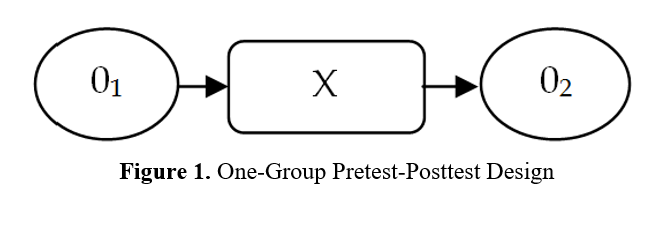The Influence of PBL Learning Model on High School Students' Learning Outcomes in System of Linear Equations in Three Variables Material
https://doi.org/10.51574/ijrer.v4i3.3582
Keywords:
Learning Model, Learning Outcomes, Problem-Based Learning, SPLTV MaterialAbstract
This study aims to determine how the application of the problem-based learning model affects the learning outcomes of class X students regarding the material on systems of linear inequalities in three variables. This research is a pre-experimental one-group pretest-posttest design, with class X research subjects at Al-Hidayah Islamic High School. The instrument used is a validated system of linear inequalities in a three-variable material understanding test. The analyses used in this study are descriptive and inferential. The study found a big improvement in learning results after using the problem-based learning (PBL) method for the System of Linear Inequalities in Three Variables material, with an average score of 46.0833 before the test and 75.6667 after. The significant value of the hypothesis test is below 0.05, which means 0.00 < 0.05; thus, H0 is rejected and H1 is accepted. This study shows a significant difference in student learning outcomes when using the Problem-Based Learning (PBL) learning model.
References
Al-Thani, N. J., & Ahmad, Z. (2025). The Scope of Problem-Based Learning and Integrated Research Education for Primary Learners. In Teaching and Learning with Research Cognitive Theory (pp. 25-43). Springer, Cham. https://doi.org/10.1007/978-3-031-87544-1_2
Anggraeni, D. M., Prahani, B. K., Suprapto, N., Shofiyah, N., & Jatmiko, B. (2023). Systematic review of problem based learning research in fostering critical thinking skills. Thinking Skills and Creativity, 49, 101334. https://doi.org/10.1016/j.tsc.2023.101334
Anugraheni, I., Gufron, A., & Purnomo, Y. W. (2025). The impact of realistic problem-based learning on mathematical connection abilities: evidence from elementary schools in Indonesia. Cogent Education, 12(1), 2523078. https://doi.org/10.1080/2331186X.2025.2523078
Asanre, A. A., Sondlo, A., & Abiodun, T. O. (2024). Impact of problem-based learning strategy on learning outcomes of senior secondary school student in mathematics. Journal of Advanced Sciences and Mathematics Education, 4(1), 15-23. https://doi.org/10.58524/jasme.v4i1.370
Ati, T. P., & Setiawan, Y. (2020). Efektivitas Problem Based Learning-Problem Solving Terhadap Kemampuan Berpikir Kritis dalam Pembelajaran Matematika Siswa Kelas V. Jurnal Cendekia : Jurnal Pendidikan Matematika, 4(1), 294–303. https://doi.org/10.31004/cendekia.v4i1.209
Aydin, Y. (2014). The effects of problem based approach on student's conceptual understanding in a university mathematics classroom. Procedia-Social and Behavioral Sciences, 152, 704-707. https://doi.org/10.1016/j.sbspro.2014.09.307
Boye, E. S., & Agyei, D. D. (2023). Effectiveness of problem-based learning strategy in improving teaching and learning of mathematics for pre-service teachers in Ghana. Social Sciences & Humanities Open, 7(1), 100453. https://doi.org/10.1016/j.ssaho.2023.100453
Căprioară, D. (2015). Problem solving-purpose and means of learning mathematics in school. Procedia-social and behavioral sciences, 191, 1859-1864. https://doi.org/10.1016/j.sbspro.2015.04.332
Christina, E. N., & Adirakasiwi, A. G. (2021). Analisis Kemampuan Pemecahan Masalah Tahapan Polya Dalam Menyelesaikan Persamaan Dan Pertidaksamaan Linear Satu Variabel. JPMI: Jurnal Pembelajaran Matematika Inovatif, 4(2), 405–424. https://doi.org/10.22460/jpmi.v4i2.405-424
Dahl, B. (2018). What is the problem in problem-based learning in higher education mathematics. European Journal of Engineering Education, 43(1), 112-125. https://doi.org/10.1080/03043797.2017.1320354
Dalila, A. A., Rahmah, S., Liliawati, W., & Kaniawati, I. (2022). The effect of differentiated learning in problem based learning on cognitive learning outcomes of high school students. Jurnal Penelitian Pendidikan IPA, 8(4), 1820-1826. https://doi.org/10.29303/jppipa.v8i4.1839
Greer, C. W., & Erickson, K. A. (2019). Teaching students with significant cognitive disabilities to count: Routine for achieving early counting. Teaching Exceptional Children, 51(5), 382-389. https://doi.org/10.1177/0040059919836451
Hendriana, H., Johanto, T., & Sumarmo, U. (2018). The Role of Problem-Based Learning to Improve Students' Mathematical Problem-Solving Ability and Self Confidence. Journal on Mathematics Education, 9(2), 291-300.
Juniati, H., & Jamaan, E. Z. (2024). Problem-based learning in improving critical mathematical thinking skills: Independent curriculum teaching module. Al-Jabar: Jurnal Pendidikan Matematika, 15(2), 493-503. https://doi.org/10.24042/ajpm.v15i2.23788
Laamena, C. M., Mataheru, W., & Hukom, F. F. (2021). Perbedaan Hasil Belajar Siswa Kelas Viii Smp Menggunakan Model Problem Based Learning (Pbl) Berbantuan Aplikasi Swishmax Dan Model Pembelajaran Konvensional Pada Materi Prisma Dan Limas. BAREKENG: Jurnal Ilmu Matematika Dan Terapan, 15(1), 029–036. https://doi.org/10.30598/barekengvol15iss1pp029-036
Lutfiyah, L., & Sulisawati, D. N. (2019). Efektivitas pembelajaran matematika menggunakan media berbasis e-learning. Jurnal Pendidikan Matematika: Judika Education, 2(1), 58-65.
Maass, K., Geiger, V., Ariza, M. R., & Goos, M. (2019). The role of mathematics in interdisciplinary STEM education. Zdm, 51(6), 869-884. https://doi.org/10.1007/s11858-019-01100-5
Mangaroska, K., Sharma, K., Gašević, D., & Giannakos, M. (2022). Exploring students’ cognitive and affective states during problem solving through multimodal data: Lessons learned from a programming activity. Journal of Computer Assisted Learning, 38(1), 40–59. https://doi.org/10.1111/jcal.12590
Muzaini, M., Hasbi, M., Ernawati, E., & Kristiawati, K. (2022). The Empowerment of Problem-Based Learning Models to Improve Students’ Quantitative Reasoning. Formatif: Jurnal Ilmiah Pendidikan MIPA, 12(1). http://dx.doi.org/10.30998/formatif.v12i1.8502
Ogunsola, O. A., Adelana, O. P., & Adewale, K. A. (2021). Effect of problem-based learning approach on students’ academic performance in senior secondary mathematics. Journal of Science and Mathematics Letters, 9(2), 75-85.
Rézio, S., Andrade, M. P., & Teodoro, M. F. (2022). Problem-based learning and applied mathematics. Mathematics, 10(16), 2862. https://doi.org/10.3390/math10162862
Shishigu, A., Hailu, A., & Anibo, Z. (2017). Problem-based learning and conceptual understanding of college female students in physics. Eurasia Journal of Mathematics, Science and Technology Education, 14(1), 145-154. https://doi.org/10.12973/ejmste/78035
Usman, P. M., Tintis, I., & Nihayah, E. F. K. (2022). Analisis Kemampuan Pemecahan Masalah Matematika Siswa dalam Menyelesaikan Sistem Persamaan Linear Tiga Variabel. Jurnal Basicedu, 6(1), 664-674. https://doi.org/10.31004/basicedu.v6i1.1990
van Velzen, J. H. (2016). Evaluating the suitability of mathematical thinking problems for senior high-school students by including mathematical sense making and global planning. The curriculum journal, 27(3), 313-329. https://doi.org/10.1080/09585176.2016.1174140
Wardani, I. S., & Fiorintina, E. (2023). Building Critical Thinking Skills of 21st Century Students through Problem Based Learning Model. JPI (Jurnal Pendidikan Indonesia), 12(3), 461-470. https://doi.org/10.23887/jpiundiksha.v12i3.58789
Wilder, S. (2015). Impact of problem-based learning on academic achievement in high school: a systematic review. Educational Review, 67(4), 414-435. https://doi.org/10.1080/00131911.2014.974511

Downloads
Published
How to Cite
Issue
Section
License
Copyright (c) 2025 Yolanda Pradinata Citra Dewi, Aswar Anas, Lutfiyah Lutfiyah

This work is licensed under a Creative Commons Attribution-ShareAlike 4.0 International License.

























